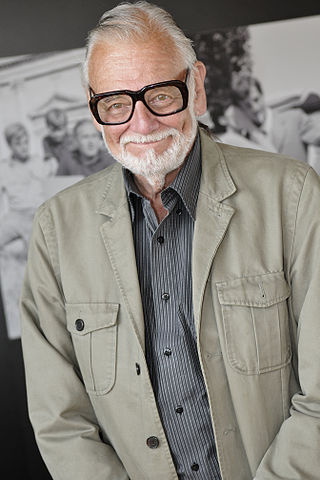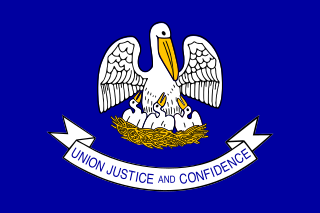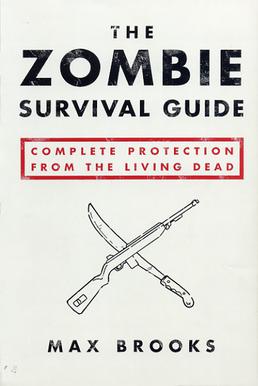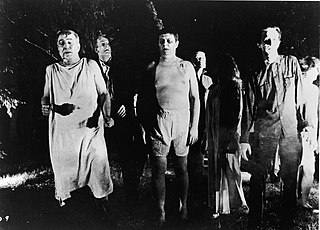Resident Evil, or Biohazard in Japan and parts of Southeast Asia, is a Japanese horror game series and media franchise created by Capcom. It consists of survival horror, third-person shooter and first-person shooter games, with players typically surviving in environments inhabited by zombies and other frightening creatures. The franchise has expanded into other media, including a live-action film series, animated films, television series, comic books, novels, audio dramas and merchandise. Resident Evil is the highest-grossing horror franchise.

Federal Emergency Management Agency (FEMA) is an agency of the United States Department of Homeland Security (DHS), initially created under President Jimmy Carter by Presidential Reorganization Plan No. 3 of 1978 and implemented by two Executive Orders on April 1, 1979. The agency's primary purpose is to coordinate the response to a disaster that has occurred in the United States and that overwhelms the resources of local and state authorities. The governor of the state in which the disaster occurs must declare a state of emergency and formally request from the President that FEMA and the federal government respond to the disaster. The only exception to the state's gubernatorial declaration requirement occurs when an emergency or disaster takes place on federal property or to a federal asset—for example, the 1995 bombing of the Alfred P. Murrah Federal Building in Oklahoma City, Oklahoma, or the Space Shuttle Columbia in the 2003 return-flight disaster.
Survivalism is a social movement of individuals or groups who proactively prepare for emergencies, such as natural disasters, and other disasters causing disruption to social order caused by political or economic crises. Preparations may anticipate short-term scenarios or long-term, on scales ranging from personal adversity, to local disruption of services, to international or global catastrophe. There is no bright line dividing general emergency preparedness from prepping in the form of survivalism, but a qualitative distinction is often recognized whereby preppers/survivalists prepare especially extensively because they have higher estimations of the risk of catastrophes happening. Nonetheless, prepping can be as limited as preparing for a personal emergency, or it can be as extensive as a personal identity or collective identity with a devoted lifestyle.

George Andrew Romero was an American-Canadian film director, writer, editor and actor. His Night of the Living Dead series of films about a zombie apocalypse began with the original Night of the Living Dead (1968) and is considered a major contributor to the image of the zombie in modern culture. Other films in the series include Dawn of the Dead (1978) and Day of the Dead (1985). He later revived his attachment to the sub-genre with Land of the Dead (2005), Diary of the Dead (2007), and Survival of the Dead (2009), his final film. Aside from this series, his works include The Crazies (1973), Martin (1977), Knightriders (1981), Creepshow (1982), Monkey Shines (1988), The Dark Half (1993), and Bruiser (2000). He also created and executive-produced the television series Tales from the Darkside from 1983 to 1988.

Emergency management or disaster management is a science and a system charged with creating the framework within which communities reduce vulnerability to hazards and cope with disasters. Emergency management, despite its name, does not actually focus on the management of emergencies, which can be understood as minor events with limited impacts and are managed through the day-to-day functions of a community. Instead, emergency management focuses on the management of disasters, which are events that produce more impacts than a community can handle on its own. The management of disasters tends to require some combination of activity from individuals and households, organizations, local, and/or higher levels of government. Although many different terminologies exist globally, the activities of emergency management can be generally categorized into preparedness, response, mitigation, and recovery, although other terms such as disaster risk reduction and prevention are also common. The outcome of emergency management is to prevent disasters and where this is not possible, to reduce their harmful impacts.

A survival kit is a package of basic tools and supplies prepared as an aid to survival in an emergency. Civil and military aircraft, lifeboats, and spacecraft are equipped with survival kits.

Hurricane Katrina was a devastating and deadly Category 5 Atlantic hurricane that caused 1,836 fatalities and damages estimated between $97.4 billion to $145.5 billion in late August 2005, particularly in the city of New Orleans and its surrounding area. At the time, it was the costliest tropical cyclone on record, later tied by Hurricane Harvey in 2017. Katrina was the twelfth tropical cyclone, the fifth hurricane, and the third major hurricane of the 2005 Atlantic hurricane season. It was also the fourth-most intense Atlantic hurricane to make landfall in the contiguous United States, gauged by barometric pressure.

As the center of Hurricane Katrina passed southeast of New Orleans on August 29, 2005, winds downtown were in the Category 1 range with frequent intense gusts. The storm surge caused approximately 23 breaches in the drainage canal and navigational canal levees and flood walls. As mandated in the Flood Control Act of 1965, responsibility for the design and construction of the city's levees belongs to the United States Army Corps of Engineers and responsibility for their maintenance belongs to the Orleans Levee Board. The failures of levees and flood walls during Katrina are considered by experts to be the worst engineering disaster in the history of the United States. By August 31, 2005, 80% of New Orleans was flooded, with some parts under 15 feet (4.6 m) of water. The famous French Quarter and Garden District escaped flooding because those areas are above sea level. The major breaches included the 17th Street Canal levee, the Industrial Canal levee, and the London Avenue Canal flood wall. These breaches caused the majority of the flooding, according to a June 2007 report by the American Society of Civil Engineers. The flood disaster halted oil production and refining which increased oil prices worldwide.

Hurricane preparedness in New Orleans has been an issue since the city's early settlement because of its location.

Criticism of the government response to Hurricane Katrina was a major political dispute in the United States in 2005 that consisted primarily of condemnations of mismanagement and lack of preparation in the relief effort in response to Hurricane Katrina and its aftermath. Specifically, there was a delayed response to the flooding of New Orleans, Louisiana.

Hurricane Rita was the most intense tropical cyclone on record in the Gulf of Mexico and the fourth-most intense Atlantic hurricane ever recorded. Part of the record-breaking 2005 Atlantic hurricane season, which included three of the top ten most intense Atlantic hurricanes in terms of barometric pressure ever recorded, Rita was the seventeenth named storm, tenth hurricane, and fifth major hurricane of the 2005 season. It was also the earliest-forming 17th named storm in the Atlantic until Tropical Storm Rene in 2020. Rita formed near The Bahamas from a tropical wave on September 18, 2005 that originally developed off the coast of West Africa. It moved westward, and after passing through the Florida Straits, Rita entered an environment of abnormally warm waters. Moving west-northwest, it rapidly intensified to reach peak winds of 180 mph (285 km/h), achieving Category 5 status on September 21. However, it weakened to a Category 3 hurricane before making landfall in Johnson's Bayou, Louisiana, between Sabine Pass, Texas and Holly Beach, Louisiana, with winds of 115 mph (185 km/h). Rapidly weakening over land, Rita degenerated into a large low-pressure area over the lower Mississippi Valley by September 26th.

Cyclone mitigation encompasses the actions and planning taken before a tropical cyclone strikes to mitigate damage and injury from the storm. Knowledge of tropical cyclone impacts on an area help plan for future possibilities. Preparedness may involve preparations made by individuals as well as centralized efforts by governments or other organizations. Tracking storms during the tropical cyclone season helps individuals know current threats. Regional Specialized Meteorological Centers and Tropical Cyclone Warning Centers provide current information and forecasts to help individuals make the best decision possible.

The Zombie Survival Guide is the first book written by American author Max Brooks, published in 2003. It is a satirical survival manual about zombies, containing information about zombie physiology and behavior, defense strategies and tactics, and includes case studies of possible zombie outbreaks throughout history. Despite its fictional subject matter, the book also includes practical information on disaster preparedness, generally.

This article covers the details of the Preparations for Hurricane Katrina, a major category 5 hurricane that devastated parts of New Orleans, Florida, Louisiana, Mississippi, and Alabama, as well as the Hurricane Pam simulation and NWS forecasts that led to the U.S. government's decision to establish a Bipartisan Congressional Committee to investigate the country's preparedness for and response to Hurricane Katrina.
Preparedness is a set of actions that are taken as precautionary measures in the face of potential disasters. Being prepared helps in achieving goals and in avoiding and mitigating negative outcomes.

A zombie is a mythological undead corporeal revenant created through the reanimation of a corpse. In modern popular culture, zombies are most commonly found in horror and fantasy genre works. The term comes from Haitian folklore, in which a zombie is a dead body reanimated through various methods, most commonly magical practices in religions like Vodou. Modern media depictions of the reanimation of the dead often do not involve magic but rather science fictional methods such as carriers, fungi, radiation, mental diseases, vectors, pathogens, parasites, scientific accidents, etc.

Zombie apocalypse is a subgenre of apocalyptic and post-apocalyptic fiction in which society collapses due to overwhelming swarms of zombies. Typically only a few individuals or small bands of survivors are left living. In some versions, the reason the dead rise and attack humans is unknown, in others, a parasite or infection is the cause, framing events much like a plague. Some stories have every corpse rise, regardless of the cause of death, whereas others require exposure to the infection.
The American Preppers Network (APN) is a non-profit corporation and part of a growing international movement of people who call themselves preppers. The social network is organized by state and regional blogs and forums. The members are volunteer contributors who are dedicated to providing free information on survival skills, preparedness, self-sufficiency and sustainability

Children's Health Fund (CHF) is a nonprofit organization that provides health care to children and families on mobile medical clinics throughout the United States. CHF was founded in 1987 by singer/songwriter Paul Simon and pediatrician/advocate Irwin Redlener. The organization began with a single mobile medical unit funded by Simon and designed by Redlener's wife, Karen. More than 20 years later, the organization has 23 programs with more than 50 mobile medical units and is the nation's leading provider of mobile-based health care for homeless and low-income children and their families. Karen Redlener remains with CHF, currently serving as the organization's executive director.
"Preparedness 101: Zombie Apocalypse" is a blog post by the United States Centers for Disease Control and Prevention (CDC) that uses a zombie apocalypse to raise public awareness of emergency preparedness. In a blog post titled "Preparedness 101: Zombie Apocalypse", the director of the CDC's Office of Public Health Preparedness and Response, Rear Admiral Ali S. Khan writes: "Take a zombie apocalypse for example. That's right, I said z-o-m-b-i-e a-p-o-c-a-l-y-p-s-e. You may laugh now, but when it happens you'll be happy you read this, and hey, maybe you'll even learn a thing or two about how to prepare for a real emergency." Comparing the upcoming hurricane season and possible pandemics to "flesh-eating zombies" from the horror film Night of the Living Dead and the video game series Resident Evil, Khan recommends Americans prepare for natural disasters as they would have prepared for "ravenous monsters".














